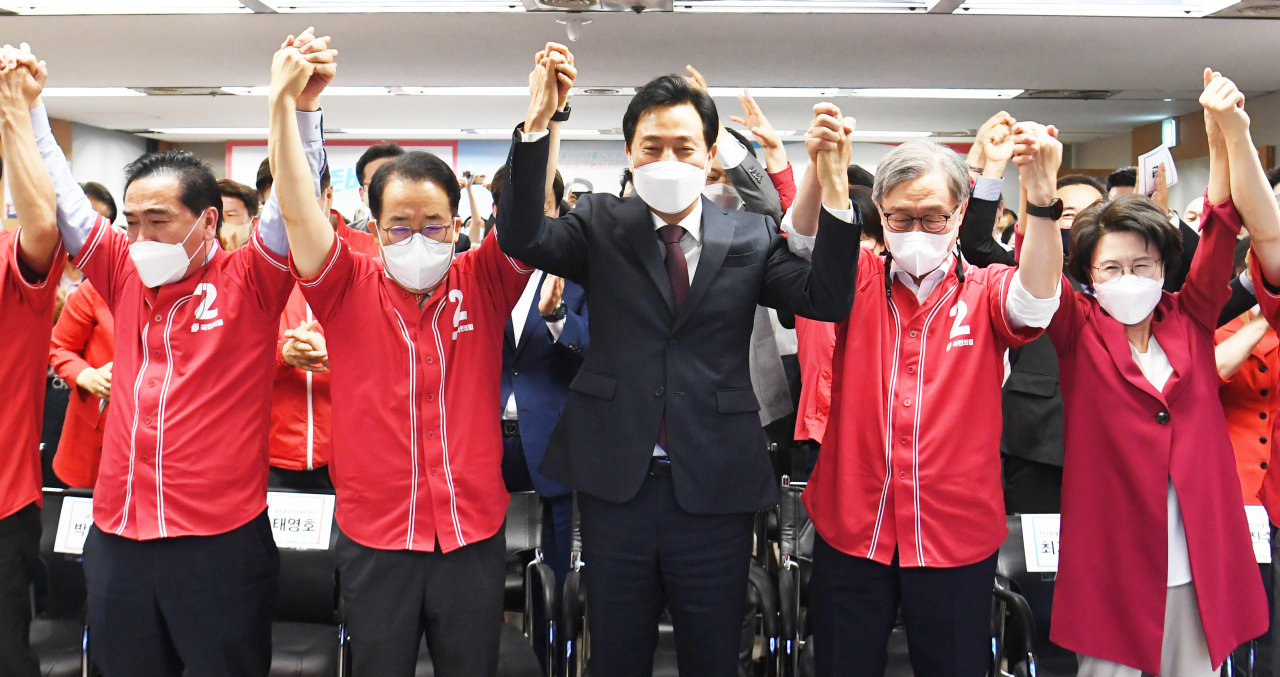S. Korea‘s conservative party notches big win over democratic party in local elections
By Shim Woo-hyunPublished : June 1, 2022 - 22:01

The ruling People Power Party was expected to score a major victory over the main opposition Democratic Party in the local elections Wednesday, taking mayorships in the country’s two largest cities, Seoul and Busan, according to an exit poll released by the country’s three major broadcasters, KBS, MBC and SBS.
In Seoul, the People Power Party’s Mayor Oh Se-hoon showed a two-digit gap over the opposition’s Song Young-gil in the exit poll. According to exit polls released at 7:30 p.m., Oh garnered 58.7 percent of the vote against Song with 40.2 percent.
Upon being reelected, Oh will claim his fourth term as mayor of Seoul. Oh will immediately return to his post on Thursday and fill the vacancy.
“I thank citizens of Seoul for their enormous support during the election campaign,” Oh said after his lead in the exit poll was announced at his campaign office in central Seoul. “I am finally a little relieved, but I will wait and see since an exit poll is just an exit poll.”
Oh previously anticipated the competition between him and Song to be a close one, staying alert to a possible turnover. Oh even guessed that the gap between him and Song could be as close as 5 percent.
The exit poll, however, echoed polls that had come out earlier, which anticipated Oh’s two-digit lead in the local elections.
In Busan, Park Heong-joon, the incumbent People Power Party mayor running for reelection, was also anticipated to score a crushing win over Byun Seong-wan of the main opposition party.
According to exit polling, Park is expected to hold 66.9 percent of the vote, doubling Byun with 33.2 percent.
Upon watching the exit poll result, Park and his aides burst into cheers and applause.
If reelected, Park, who had been leading Busan since the by-election in April 2021, will also immediately return to his post.
The gubernatorial election in Gyeonggi Province, however, remained foggy as the candidates from the two parties, Kim Eun-hye of the People Power Party and former Finance Minister Kim Dong-yeon of the Democratic Party, were in a neck-and-neck battle in the exit poll.
Exit polls from the broadcasting firms said Kim of the People Power Party had 49.4 percent of the vote, while her opponent stood at 48.8 percent.
Another exit poll released by broadcaster JTBC also showed Kim of the People Power Party at 49.6 percent of the vote, with a marginal lead against Kim of the Democratic Party with 48.5 percent.
Other regions that had close battles include Daejeon, Sejong and South Chungcheong Province, according to exit polls from broadcasters.
In Daejeon, the People Power Party’s mayoral candidate Lee Jang-woo was shown with 50.4 percent of the vote, leading Heo Tae-jeong of the Democratic Party with 49.6 percent. In neighboring Sejong, the ruling party’s Choi Min-ho, with 50.6 percent of the vote, was 1.2 percent ahead of Lee Choon-hee, the incumbent mayor of the city who was predicted to clinch 49.4 percent.
The People Power Party’s lead in South Chungcheong Province was relatively greater than those of Daejeon and Sejong. Kim Tae-heum of the People Power Party was shown with 54.1 percent of the vote, while Yang Seung-jo, the incumbent governor, had 45.9 percent.
Besides the four regions with tight margins, the People Power Party was expected to win at least nine out of the 17 metropolitan mayoral and provincial gubernatorial posts, including Seoul, Busan, Daegu, Incheon, Ulsan, Gangwon Province, North Chungcheong Province and both South Gyeongsang and North Gyeongsang provinces.
The Democratic Party, on the other hand, was expected to score decisive wins in only four regions, Gwangju, Jeju Island and both South Jeolla and North Jeolla provinces.





![[Herald Interview] 'Amid aging population, Korea to invite more young professionals from overseas'](http://res.heraldm.com/phpwas/restmb_idxmake.php?idx=644&simg=/content/image/2024/04/24/20240424050844_0.jpg&u=20240424200058)












![[KH Explains] Korean shipbuilding stocks rally: Real growth or bubble?](http://res.heraldm.com/phpwas/restmb_idxmake.php?idx=652&simg=/content/image/2024/04/25/20240425050656_0.jpg&u=)

